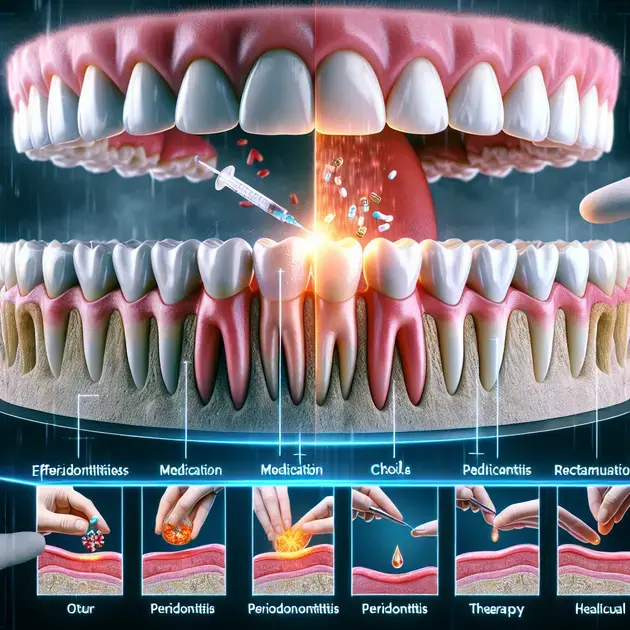Today, understanding medication for periodontitis is more important than ever as research continues to uncover new treatment options for this common dental condition.
With advancements in the pharmaceutical industry, there are now various medications available that can effectively combat the symptoms and progression of periodontitis, providing hope for those suffering from this chronic inflammatory disease.

The Benefits of Medication for Periodontitis Treatment
Periodontitis is a serious gum infection that damages the soft tissue and destroys the bone that supports your teeth. While medication is not a standalone treatment for periodontitis, it can play a crucial role in managing the symptoms and promoting healing when used in combination with other dental interventions.
One of the key benefits of medication for periodontitis treatment is its ability to reduce inflammation and control bacterial growth in the gums. Antibiotics such as doxycycline can be prescribed to target and eliminate the specific bacteria responsible for the infection.
To access information on medications commonly used in periodontitis treatment, you can visit reputable medical websites such as WebMD or the American Academy of Periodontology’s official website. These sources provide detailed insights into the different types of medications available, their dosages, potential side effects, and how they work to combat periodontitis.
It is essential to follow your dentist’s instructions carefully when taking medication for periodontitis. Proper dosage and adherence to the prescribed treatment plan are crucial for maximizing the benefits of the medication and supporting the healing process.
In addition to antibiotics, your dentist may also recommend antimicrobial mouth rinses or gels to target bacteria in hard-to-reach areas of the mouth. These products can complement the effects of systemic medication and help reduce plaque and inflammation in the gums.
Key Medications for Managing Periodontitis Symptoms
Managing periodontitis symptoms effectively often involves a combination of medications tailored to address the specific needs of each patient. Some key medications commonly used in periodontitis treatment include antibiotics, antimicrobial mouthwashes, and prescription-strength gels.
To find detailed information on the key medications used for managing periodontitis symptoms, you can consult reputable dental health resources such as the American Dental Association’s official website or the National Institute of Dental and Craniofacial Research. These sources provide comprehensive guides on the different types of medications available, their applications, and potential benefits for patients with periodontitis.
When considering medications for managing periodontitis symptoms, it is crucial to work closely with your dental healthcare provider to determine the most suitable treatment plan for your specific condition. Your dentist will evaluate the severity of your periodontitis, assess your overall health status, and recommend medications that align with your individual needs.
Key medications such as tetracycline antibiotics, chlorhexidine mouth rinses, and prescription gels containing antimicrobial agents can help reduce inflammation, control bacterial growth, and support the healing of gum tissues affected by periodontitis. Following your dentist’s guidance on medication usage is essential for achieving positive treatment outcomes.
Understanding the Role of Medication in Periodontitis Care
Medication plays a crucial role in periodontitis care by targeting the underlying causes of the gum infection and promoting healing in the affected tissues. Understanding how medication interacts with the oral microbiome and the inflammatory response in periodontitis is essential for optimizing treatment outcomes.
For in-depth insights into the role of medication in periodontitis care, you can explore scientific journals and research articles available on platforms such as PubMed or the Journal of Periodontology. These resources offer valuable information on the mechanisms of action of different medications, their effects on periodontal tissues, and the latest advancements in pharmacological approaches to managing periodontitis.
Effective periodontitis care often involves a multifaceted treatment approach that combines medications with professional dental cleanings, scaling and root planing procedures, and ongoing oral hygiene maintenance. By integrating medication into a comprehensive treatment plan, patients can experience improved gum health, reduced inflammation, and better overall oral wellbeing.
It is essential for patients undergoing periodontitis care to communicate openly with their dental healthcare providers about their medication use, including any allergies, side effects, or changes in their oral health condition. This collaborative approach ensures that the medication prescribed aligns with the patient’s needs and supports the long-term management of periodontitis.

Choosing the Right Medication for Gum Health Management
When it comes to gum health management, choosing the right medication is crucial for maintaining optimal oral health. There are several factors to consider when selecting the appropriate medication for gum health, including the severity of the condition, any underlying health issues, and the individual’s overall oral care routine. It is important to consult with a healthcare professional or dentist before starting any new medication for gum health management.
One effective medication option for gum health management is medicated mouthwash. These mouthwashes often contain antibacterial agents that can help reduce plaque buildup and prevent gum disease. Using a medicated mouthwash as part of a daily oral hygiene routine can be an easy and effective way to support gum health.
In more severe cases of gum disease, a dentist may recommend prescription-strength medication, such as antibiotics or antimicrobial agents. These medications are typically used for a short period to target and eliminate the underlying infection causing gum disease. It is important to follow your dentist’s instructions carefully when using prescription medication for gum health management.
Another important aspect of choosing the right medication for gum health management is considering any potential side effects or interactions with other medications. Some medications may cause dry mouth, which can contribute to gum disease, while others may interact with existing medications. Be sure to discuss any concerns or questions with your healthcare provider before starting a new medication for gum health.
In conclusion, selecting the right medication for gum health management is essential for maintaining optimal oral health. By considering factors such as the severity of the condition, individual health needs, and potential side effects, individuals can make informed decisions about their gum health management routine. Consult with a healthcare professional or dentist to determine the best medication options for your specific needs.
Exploring Effective Medication Options for Periodontitis Care
When exploring effective medication options for periodontitis care, it is important to consider the various treatment approaches available to manage this chronic inflammatory condition. Periodontitis, or advanced gum disease, requires a comprehensive treatment plan that may include both non-surgical and surgical interventions, along with medication therapy to control the infection and inflammation.
One common medication option for periodontitis care is antibiotic therapy. Antibiotics may be prescribed to target the bacteria causing the gum infection and help reduce inflammation. These medications can be taken orally or applied directly to the gum pockets, depending on the severity of the periodontitis and the individual’s response to treatment.
In addition to antibiotics, antimicrobial mouth rinses are another effective medication option for periodontitis care. These mouth rinses contain agents that can help reduce bacterial growth in the mouth and promote healing of the gum tissue. Incorporating an antimicrobial mouth rinse into a daily oral hygiene routine can complement other periodontal treatments and support overall gum health.
In more advanced cases of periodontitis, a dentist may recommend surgical intervention in addition to medication therapy. Surgical procedures such as scaling and root planing, flap surgery, or bone and tissue grafts may be necessary to remove bacteria and calculus from deep within the gum pockets and restore gum health. Medications prescribed before and after surgery can help manage pain, prevent infection, and support the healing process.
Overall, exploring effective medication options for periodontitis care involves a multi-faceted approach that combines medication therapy with other periodontal treatments. By working closely with a dentist or periodontist to develop a personalized treatment plan, individuals can effectively manage periodontitis and improve their oral health outcomes.
The Impact of Medication Choices on Periodontitis Treatment Success
The impact of medication choices on periodontitis treatment success is significant, as selecting the right medications can greatly influence the outcome of periodontal therapy. Effective medication choices can help control the infection, reduce inflammation, and support the healing of gum tissue, leading to improved periodontitis treatment outcomes and long-term oral health.
Choosing the appropriate antibiotics or antimicrobial agents for periodontitis treatment is essential in targeting the specific bacteria causing the infection and preventing its recurrence. These medications can be administered systemically or topically, depending on the severity of the periodontitis and the individual’s overall health. Proper use of antibiotics under the guidance of a healthcare provider is crucial for maximizing their effectiveness and minimizing antibiotic resistance.
In addition to antibiotic therapy, medication choices such as pain relief medications and anti-inflammatory drugs can play a role in managing the symptoms of periodontitis and supporting the healing process. These medications can help reduce discomfort, swelling, and inflammation associated with periodontal treatment, making the recovery process more comfortable for patients.
It is important to consider the potential side effects and interactions of medications when making treatment decisions for periodontitis. Some medications may have adverse effects on oral health or interact with other medications, highlighting the importance of clear communication between patients, dentists, and healthcare providers. By being informed about medication choices and actively participating in treatment decisions, individuals can maximize the success of their periodontitis therapy.
In conclusion, the impact of medication choices on periodontitis treatment success underscores the importance of a comprehensive and personalized approach to managing this chronic inflammatory condition. By selecting the right medications, addressing individual needs and concerns, and closely following treatment recommendations, individuals can achieve successful outcomes in their periodontal therapy and maintain long-term oral health.
Conclusion
Choosing the right medication for gum health management is crucial for maintaining optimal oral health. Factors such as severity of the condition, individual health needs, and potential side effects must be considered when selecting medication. Consulting with healthcare professionals or dentists before starting any new medication is essential to ensure effective gum health management.
Medicated mouthwash can be an effective option for gum health management, containing antibacterial agents that help reduce plaque buildup and prevent gum disease. In more severe cases, prescription-strength medication like antibiotics or antimicrobial agents may be necessary to target and eliminate gum disease-causing infections. Following dentist’s instructions diligently is important for proper medication use.
Exploring effective medication options for periodontitis care involves a comprehensive approach, combining medication therapy with non-surgical, surgical interventions. Antibiotic therapy and antimicrobial mouth rinses are common medication choices for periodontitis care, aiding in reducing bacterial growth and promoting gum tissue healing. Collaboration with dentists or periodontists to develop personalized treatment plans is key to managing periodontitis effectively.
The impact of medication choices on periodontitis treatment success is significant, influencing periodontal therapy outcomes and long-term oral health. Proper selection of antibiotics or antimicrobial agents is crucial in targeting the infection and preventing recurrence. Additionally, pain relief medications and anti-inflammatory drugs can help manage symptoms and support the healing process, enhancing patient comfort during recovery.
In conclusion, the right medication choices are vital for successful gum health management and periodontitis care. Individuals should be informed about potential side effects, medication interactions, and actively participate in treatment decisions. By selecting appropriate medications, addressing individual needs, and following treatment recommendations closely, individuals can achieve positive outcomes in their oral health management journey.



